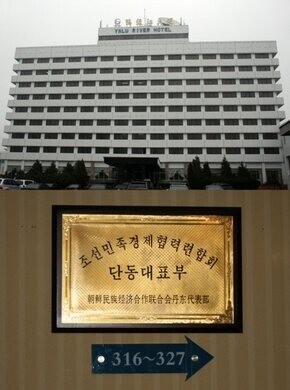hankyoreh
Links to other country sites 다른 나라 사이트 링크
N. Korean firm loses suit against S. Korean companies

A North Korean business lost its first trial in a lawsuit filed in South Korean court over alleged nonpayment for items by South Korean companies it was doing business with.
Judge Kim Choon-su of the 27th civil division of the Seoul Central District Court ruled against the plaintiffs Tuesday in a case filed by the North Korean business Myongji Company, the National Economic Cooperation Federation (a North Korean organization in charge of private sector economic cooperation with the South), and their legal representative, South-North Economic Cooperation Research Center director Kim Han-sin.
The case was filed against four South Korean companies to demand payment of 100 million won (US$89,573) to each plaintiff for the items, along with additional damages for the delay.
In February 2010, the Myongji Company signed a contract for electroplating zinc with three South Korean businesses, with payment to be received from one of them identified as “Company A.”
In its lawsuit, it claimed that it had supplied all of the items, yet had been unable to receive the payment of approximately US$4.74 million due to the May 24 measures imposed by the South Korean government in 2010 to sanction the North in response to the ROKS Cheonan sinking.
The court concluded that the Myongji Company could not be seen as having entered into a contract with the South Korean businesses.
An examination of the bill of lading and invoice drafted by the South and North Korean companies and the associated bank account numbers showed the transaction to have taken place through a third-party intermediary, “Company B,” rather than directly between the parties. Under this transaction arrangement, Company B purchased the items from the North Korean company and sold them back to the South Korean companies.
“There is insufficient evidence to conclude that the Myongji Company entered a contract on this matter with the South Korean businesses, and there is no evidence for interpreting this differently,” the court said.
The court also said neither of the other plaintiffs, the National Economic Cooperation Federation or Kim Han-sin, had the right to demand payment for the items. The federation is merely a higher-level organization managing and overseeing North Korean enterprises doing business with the South, while Kim was a representative for the other plaintiffs in the case, it explained.
As a lawsuit filed by a North Korean company against South Korean ones, the case sparked a debate over whether a South Korean court would even have jurisdiction.
The court in the first trial concluded that the matter was one over which a South Korean court would indeed have jurisdiction. It based this conclusion on Article 3 of the South Korean Constitution, which states that the “territory of the Republic of Korea shall consist of the Korean peninsula and its adjacent islands,” and the Act on Private International Law, which states, “In case a party or a case in dispute is substantively related to the Republic of Korea, a court shall have the international jurisdiction.”
By Shin Min-jung, staff reporter
Please direct comments or questions to [english@hani.co.kr]

Editorial・opinion
![[Column] Park Geun-hye déjà vu in Yoon Suk-yeol [Column] Park Geun-hye déjà vu in Yoon Suk-yeol](https://flexible.img.hani.co.kr/flexible/normal/500/300/imgdb/original/2024/0424/651713945113788.jpg) [Column] Park Geun-hye déjà vu in Yoon Suk-yeol
[Column] Park Geun-hye déjà vu in Yoon Suk-yeol![[Editorial] New weight of N. Korea’s nuclear threats makes dialogue all the more urgent [Editorial] New weight of N. Korea’s nuclear threats makes dialogue all the more urgent](https://flexible.img.hani.co.kr/flexible/normal/500/300/imgdb/original/2024/0424/7317139454662664.jpg) [Editorial] New weight of N. Korea’s nuclear threats makes dialogue all the more urgent
[Editorial] New weight of N. Korea’s nuclear threats makes dialogue all the more urgent- [Guest essay] The real reason Korea’s new right wants to dub Rhee a founding father
- [Column] ‘Choson’: Is it time we start referring to N. Korea in its own terms?
- [Editorial] Japan’s rewriting of history with Korea has gone too far
- [Column] The president’s questionable capacity for dialogue
- [Column] Are chaebol firms just pizza pies for families to divvy up as they please?
- [Column] Has Korea, too, crossed the Rubicon on China?
- [Correspondent’s column] In Japan’s alliance with US, echoes of its past alliances with UK
- [Editorial] Does Yoon think the Korean public is wrong?
Most viewed articles
- 1‘We must say no’: Seoul defense chief on Korean, USFK involvement in hypothetical Taiwan crisis
- 2N. Korean delegation’s trip to Iran shows how Pyongyang is leveraging ties with Moscow
- 3[Column] Park Geun-hye déjà vu in Yoon Suk-yeol
- 4Amnesty notes ‘erosion’ of freedom of expression in Korea in annual human rights report
- 5‘Weddingflation’ breaks the bank for Korean couples-to-be
- 646% of cases of violence against women in Korea perpetrated by intimate partner, study finds
- 7[Reportage] On US campuses, student risk arrest as they call for divestment from Israel
- 8“Parental care contracts” increasingly common in South Korea
- 9[Interview] Dear Korean men, It’s OK to admit you’re not always strong
- 10Korean government’s compromise plan for medical reform swiftly rejected by doctors